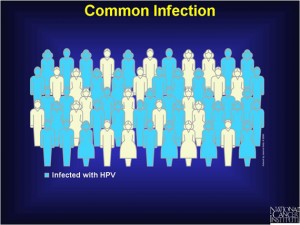
Human Papilloma Virus (HPV): To vaccinate or not to vaccinate?
-
Recently, there was a poll that indicated that 40 percent of parents intended to not vaccinate their daughters against HPV due to health concerns (1). It seems likely that even fewer will choose to vaccinate their sons.
Over the last 10-15 years, there has been an epidemic of cancers in the back of the throat, known as oropharyngeal cancers that are caused by the Human Papilloma Virus or HPV. This kind of cancer used to be very rare. Now it is one of the most common cancers that we treat in the head and neck cancer program at Fox Chase Cancer Center (2). This new cancer, like other cancers in this location, is a squamous cell carcinoma, but it has a different appearance under the microscope. It also has a different molecular profile.
For one thing, there is very little damage at the DNA level (3). This makes sense. Traditionally, the only people who developed oropharyngeal cancer were those who smoked. Tobacco causes widespread damage to genetic material or DNA creating abnormal cells with an enhanced ability to invade and spread in the body. In contrast, when the HPV virus infects cells, it hijacks the cellular control centers without causing genetic damage. The infected cells acquire the ability to invade and spread. The virus is identified in the cancer, and causes characteristic changes in the expression of certain proteins, such as p16.
The human papilloma virus has likely been around since antiquity, causing cervical cancer among women. However, the virus behaves differently in the throat. For one thing, it infects males preferentially. Also, you don’t need to have sex to get it. Certainly not what teens would consider sex these days. Changes in attitude towards oral sex are likely behind the increasing incidence of oropharyngeal cancer.
The way in which the HPV virus has gone from being a rare cause to the predominant cause of oropharyngeal cancer over a few short years has shaken the oncology community to its core.
HPV-related oropharyngeal cancer develops in younger people, those in their 30s, 40s and 50s who overwhelmingly subscribe to a healthy lifestyle. Treating this cancer has severe unavoidable side-effects, that stay with them throughout their lives.
There is no way to screen for HPV-related oropharyngeal cancer. Currently, vaccination is the only known way to prevent it.
In 2011, an Advisory Committee on Immunization Practices for the Centers of Disease Control and Prevention recommended routine vaccination for boys. This paved the way for insurance to cover such vaccinations for boys. The HPV vaccine has a long safety record (4). Dispelling misinformation will be important if we are to expect vaccination rates higher than those seen among girls.
1. Smith M. Parental Fear Blocks HPV Vaccination for Teens. ABC News. March 18, 2013, 2013.
2. Andrews G, Lango M, Cohen R, et al. Nonsurgical management of oropharyngeal, laryngeal, and hypopharyngeal cancer: the Fox Chase Cancer Center experience. Head & neck. Oct 2011;33(10):1433-1440.
3. Stransky N, Egloff AM, Tward AD, et al. The mutational landscape of head and neck squamous cell carcinoma. Science. Aug 26 2011;333(6046):1157-1160.
4. Kuehn BM. CDC panel recommends vaccine for smokers; reviews HPV safety data. JAMA: the journal of the American Medical Association. Dec 17 2008;300(23):2713-2714.
